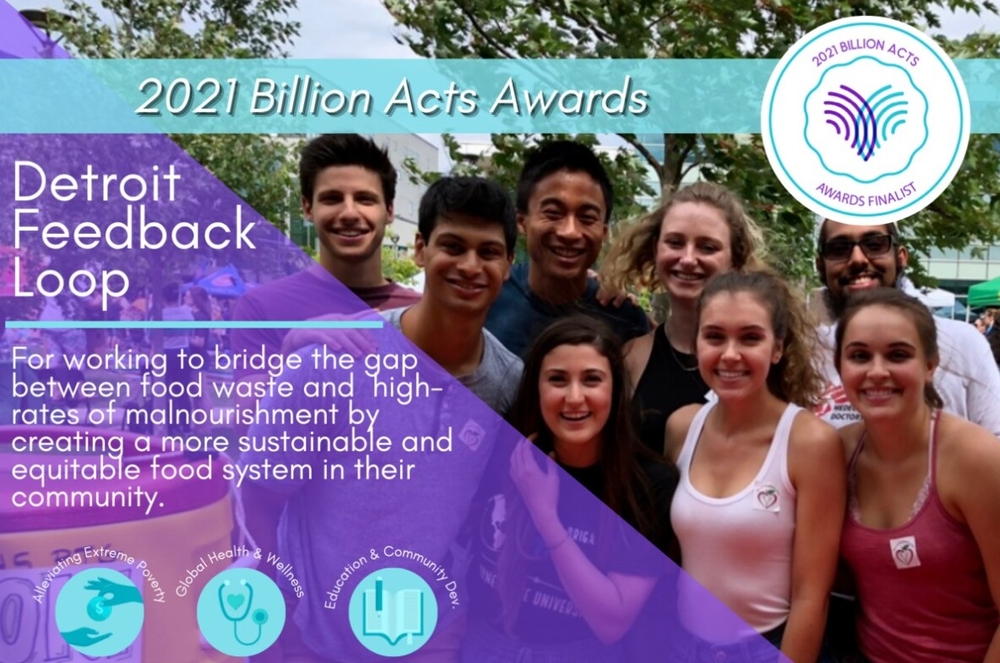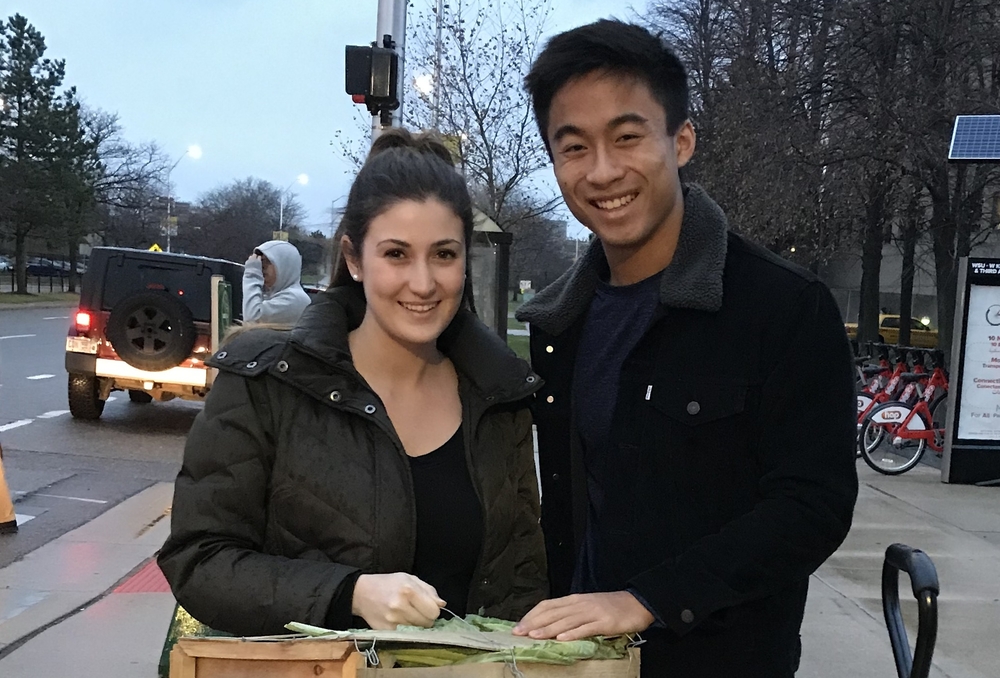
A nonprofit that's delivered more than 54,000 meals to Detroiters in need — and was started by two OUWB students — is a finalist for a 2021 Billion Acts of Peace Award.
Detroit Feedback Loop (DFL) is one of seven finalists for the award, each selected from millions of other projects and organizations from around the world.
DFL was started in 2017 by Nicholas Ang and Camilla Cascardo, who are now third-year medical students at Oakland University William Beaumont School of Medicine. The nonprofit aims to connect cafeterias, restaurants, and other businesses that have leftover food with Detroit residents who are in need.
The Billion Acts Campaign is led by 14 Nobel Peace Laureates, including The Dalai Lama, Desmond Tutu, Rigoberta Menchu and other Nobel Peace Prize winners who have worked with the PeaceJam organization for 21 years to mentor over 1.2 million youth worldwide.
According to its website, Billion Acts annually “reviews millions of Acts of Peace and Projects from nearly every country around the world, to identify, celebrate and amplify the amazing youth leaders who are creating change in their corner of the world. Each year, a new truly incredible group of winners are chosen and celebrated worldwide.”
“It’s really heartwarming to see that people appreciate the work we’ve done,” said Cascardo.
The OUWB students don’t know who nominated DFL. Cascardo said it was a “shock” to learn DFL was named a finalist for 2021.
As a finalist, DFL is featured on the Billion Acts website (if at least 500 people click on “support” for DFL by Dec. 16 — the same day this year’s winners will be announced — the nonprofit will receive a $500 grant).
Ang said he’s hopeful being named as a finalist will raise awareness and inspire others to start and lead similar projects in other regions.
“(Being a finalist) gives us an opportunity to share the lessons we learned from building this organization,” said Ang. “We all recognize problems. It’s harder to figure out what the solutions are…but you just have to take the time to look around and find ways to connect resources like we did.”
Bridging a gap
 | |
| DFL began as a project when Ang and Cascardo were undergrads at Wayne State University. | |
 | |
| DFL began as a project when Ang and Cascardo were undergrads at Wayne State University. |
DFL began as a project when Ang and Cascardo were undergrads at Wayne State University.
Cascardo said the two friends became aware of the large amounts of leftover food that were going to waste.
In this context, “leftover food” means perishable food that has been prepared, but not served. It can also mean excess fresh fruits and vegetables that would otherwise be destined for a garbage dump.
Cascardo said “it made us think there was something we could do because we’re living in the city of Detroit and we see homeless people all the time on and near campus — sometimes even in the (WSU) cafeterias.”
“We wanted to bridge that gap,” she said.
They began delivering leftovers to area shelters and found were welcomed with open arms.
Ang and Cascardo took DFL to the next level by participating in OptimizeWayne, WSU’s student-run social impact incubator. In 2018, DFL took first place in the OptimizeWayne Social Innovation Challenge. (DFL also was a Sparky Anderson Youth in Philanthropy award recipient in 2018.)
The OptimizeWayne experience included guidance on how to turn the pet project into an actual nonprofit, which opened more doors for DFL. Having 501(c)(3) status allowed DFL to form partnerships and sign contracts with other sources — bakeries, retailers like Whole Foods, area restaurants, and other nonprofits like Forgotten Harvest and Gleaners Community Food Bank.
“We were able to fill a specific niche of need, delivering prepared or highly perishable meals the same day,” said Ang. “We were able to get food from places all around the city that would otherwise waste quality prepared meals and baked goods.”
The reaction was overwhelmingly positive. Ang recalled one chef working in Corktown who had come from a lower income background.
“(He) told us he felt really bad throwing out food, but they didn’t have the time to donate…they didn’t know what to do with it,” said Ang. “People like that are super thankful that the food isn’t just going to waste.”
Helping break the poverty cycle
An estimated 60,000 pounds of food have been kept from going to waste via DFL.
But in a bio about DFL on the Billion Acts website, Ang and Cascardo stress that DFL is not just about keeping food from going to landfills.
| Vote for DFL | |
| DFL is featured on the Billion Acts website (if at least 500 people click on “support” for DFL by Dec. 16 — the same day this year’s winners will be announced — the nonprofit will receive a $500 grant). | |
| Vote for DFL | |
| DFL is featured on the Billion Acts website (if at least 500 people click on “support” for DFL by Dec. 16 — the same day this year’s winners will be announced — the nonprofit will receive a $500 grant). |
“Poor nutrition is a major contributor to this population’s elevated rates of diabetes,” states the bio. “Furthermore, health disparities such as decreased access to affordable health care and poor health education exacerbate this health condition and others related to it.”
They liken the problems to a snowball rolling down a snow-covered mountain.
“Each issue building upon the next until the collection of problems become an unstoppable, cyclical force continuing to spiral further into the depths of poverty,” the bio states.
“Poverty is by no means solvable by one or two kind acts, but rather a multitude of purposeful acts that collectively could give those struggling a chance to fight the uphill battle. These acts can level the playing field, allowing people to break the cycle of poverty.”
A more malleable world
As part of OUWB’s Class of 2023, Ang and Cascardo started med school in 2019. As founders of DFL, they have served in advisor roles to subsequent teams of student leaders who have carried on with what they started.
Both point to myriad ways the experience will help them be better physicians.
“A lot of the things that we’ve done with this organization are really applicable to what we’ll be need to use in the future as physicians,” said Cascardo.
She said it’s helped them practice leadership and teamwork skills — all while serving the community by helping people understand the link between nutrition and chronic health conditions such as diabetes and hypertension.
Ang agreed and added DFL has helped him understand the importance of being able to not just identify a need, but come up with a solution — something he expects to do daily as a physician.
“It opens up the idea of feeling like the world around us is more malleable and we can actually create solutions to things we see as issues,” he said.
For more information, contact Andrew Dietderich, marketing writer, OUWB, at adietderich@oakland.edu.
To request an interview, visit the OUWB Communications & Marketing webpage.
NOTICE: Except where otherwise noted, all articles are published under a Creative Commons Attribution 3.0 license. You are free to copy, distribute, adapt, transmit, or make commercial use of this work as long as you attribute Oakland University William Beaumont School of Medicine as the original creator and include a link to this article.

